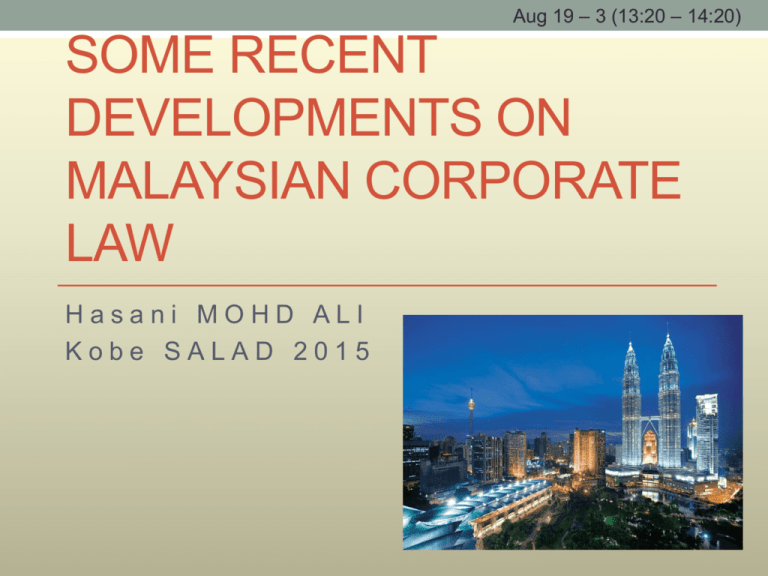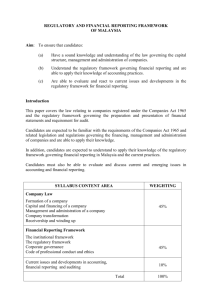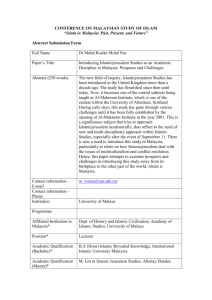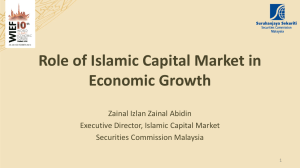some recent developments on malaysian corporate law
advertisement

Aug 19 – 3 (13:20 – 14:20) SOME RECENT DEVELOPMENTS ON MALAYSIAN CORPORATE LAW Hasani MOHD ALI Kobe SALAD 2015 Corporate laws CSR Company law Securities regulation Islamic Markets Corporate governance Insolvency law Regulatory framework • Companies Commission of Malaysia • Securities Commission of Malaysia • Bursa Malaysia • Bank Negara Malaysia • ++ Company Law LLP Companies Act 1965 Limited Liability Partnership Act 2012 2007 Amendment New Draft of Companies Act Company Law 2007 Amendments Directors’ duties •Fiduciary duties •Business Judgment Rule Minority Shareholders’ Protection •Derivative action Audit Electronics •Whistleblowing •disclosure •Filing •Meetings Limited Liability Partnership (LLP) LLP Act 2012 LLP Regulations 2012 General Guidelines For Registration of Limited Liability Partnership And Related Matters • Limited Liability Partnership (LLP) - a company + a conventional partnership. The LLP business structure - for all lawful business purposes with a view to make profit. professionals such as Lawyers, Chartered Accountants and Company Secretaries. start ups, small and medium enterprises (SMEs) Without personal liabilities, personal assets and strict compliance requirements. limited liability to its partners similar to the limited liability enjoyed by shareholders of a company flexibility of internal business regulation through partnership arrangement similar to a conventional partnership. Any debts and obligations of the LLP will be borne by the assets of the LLP and not that of its partners’. • An LLP has the legal status of a body corporate – capable of suing and being sued in its own name, holding assets and • doing such other acts and things in its name as bodies corporate may lawfully do and suffer. • flexibility in terms of its formation, maintenance and termination • has the necessary dynamics and appeal to be able to compete domestically and internationally. • 1 • Strengthening the corporate governance structure in relation to Company Law PUBLIC CONSULTATION ON THE NEW COMPANIES BILL JULY 2013 POLICY STATEMENTS AND OTHER GUIDING PRINCIPLES the affairs of the directorship of a company which include: the relationship between the board of directors and shadow directors; clarifying the minimum age for directorship and abolishing the maximum age for directorship; revising the residency requirement for directorship; restructuring the rules pertaining to the appointment, resignation and removal of directors; codifying the requirement for remuneration of directors of public companies to be sanctioned; providing members the right to inspect directors’ contract of service with public companies; requiring any payment for loss of office of directors of public companies to be approved by disinterested members clarifying the rules relating to exemption and indemnification of directors’ and officers’/auditors’ liability; and enhancing the rules relating to disqualification of directors. • 2. • Reinforcing the roles, functions and obligations of the company secretaries. • 3. • Establishment of a mandatory registration regime for practicing Company Law PUBLIC CONSULTATION ON THE NEW COMPANIES BILL JULY 2013 POLICY STATEMENTS AND OTHER GUIDING PRINCIPLES • • • • • • • • • • • • company secretaries. 8. Integrating the content of the new Companies Act with the notions and elements of corporate responsibility. 4. Enhancement of shareholders’ rights and protection through: Clarifying the application of rules relating to oppression of members’ rights; Refining the application of statutory derivative actions; and Reforming the rules relating to variations of class rights and preference shareholders Strengthening and refining procedures on dividend. 5. Strengthening the corporate governance structure through refinement of auditors’ role and responsibilities by: retaining the mandatory requirement for the appointment of auditor(s) for all types of companies; introducing a new regime for the appointment of auditors for private companies in view of the proposal to lift the requirement for holding annual general meetings; Company Law PUBLIC CONSULTATION ON THE NEW COMPANIES BILL JULY 2013 POLICY STATEMENTS AND OTHER GUIDING PRINCIPLES 6. Strengthening the corporate governance structure through refinement of auditors’ role and responsibilities by: retaining the mandatory requirement for the appointment of auditor(s) for all types of companies; introducing a new regime for the appointment of auditors for private companies in view of the proposal to lift the requirement for holding annual general meetings; enhancing the rules relating to the resignation of auditors; relying on industry practice for mandatory audit rotation of audit firms; and granting access to auditors on all communications relating to any resolutions which the company proposes to pass by way of the written resolution procedure. 7 • Reaffirming the importance of audited financial statements the timely disclosure of such information and aligning the company law provisions with International and Best auditing practices. 8. • Strengthening good corporate governance practices through enhancement and refinement of rules pertaining to transactions involving directors and substantial shareholders in the following areas: • rules relating to substantial property transactions and persons connected with directors or substantial shareholders; and disclosure principles to avoid conflict of interests. • 9 • Simplifying, refining and expediting the winding up process by: • shortening the time taken to wind up a company; introducing Company Law PUBLIC CONSULTATION ON THE NEW COMPANIES BILL JULY 2013 POLICY STATEMENTS AND OTHER GUIDING PRINCIPLES • • • • • • • • and defining the parameters for exempt dispositions; refining the concept of undue preference transactions; preserving the assets of the company; increasing the threshold for statutory amount of debts to prevent abuse by creditors; empowering the Court to terminate winding up proceedings to ascertain the status of a company; enhancing the roles of liquidators to facilitate the smooth process of liquidation; enhancing the rights of creditors; reaffirming the rules relating to preferential debts; and providing adequate protection to employees as unsecured creditors. 10. Modernising the insolvency law by introducing alternative corporate rescue mechanisms for companies whose business are still viable through: introduction of the concept of judicial management scheme; and introduction of the concept of corporate voluntary arrangement. 11 Restructuring the concept of scheme of arrangements between a company and its creditors. 12. Refining the role of receivers/receiver • clarifying the status and power of receivers; and introducing new provisions relating to liability, indemnity and priority over receiver’s costs. Company Law PUBLIC CONSULTATION ON THE NEW COMPANIES BILL JULY 2013 POLICY STATEMENTS AND OTHER GUIDING PRINCIPLES 13. Refining the current system of registration of charges by improving the procedures and process involved. 14. Modernizing the enforcement regime by: • introducing the concept of civil and administrative proceedings for selected types of breaches of the Companies Act alongside criminal sanctions; criminal sanctions to be imposed against the officers responsible instead of the company; and refining the rules pertaining to disqualification of directors. 15. To introduce a comprehensive financial reporting framework which is in line with the international accounting standards and accounting practices by: I. assessing the relevance of the Ninth Schedule of CA1965 as jurisdictions such as Singapore, Australia and the United Kingdom have since removed the equivalent of the schedule from their Companies Act; II. aligning inconsistencies between the Ninth Schedule of CA 1965 vis-à-vis the MASB standards; III. reviewing the details to be disclosed in the directors’ report with respect to the company’s profit and loss for a financial year; and IV. refining the provisions on matters relating to dividends. Securities regulation Capital Market Masterplan Capital Market & Services Act 2007 Securities Commission Act 1993 Corporate Governance Islamic Markets Audit Oversight Board CSR Money Laundering and Anti-terrorism Act Mergers & Acquisitions • August 2006, the Malaysia International Islamic Islamic markets Capital Market Masterplan 2001 Capital Market Masterplan 2 2011 Guidelines on the Offering of Islamic Securities Capital Markets and Services Act 2007 (“CMSA”) Financial Centre (MIFC) - to promote Malaysia as the international hub of Islamic finance, and to strengthen the country’s role as an intellectual epicentre for Islamic finance. • The MIFC - a community network of financial and market regulatory bodies, Government Ministries and Agencies, financial institutions, human capital development institutions and profesional services companies that are participants in Islamic finance activities. • the world’s most comprehensive Islamic financial system which includes Islamic Banking, Islamic Capital Market, Takaful and Retakaful, and Islamic Interbank Money Market. Islamic markets Malaysian Securities Commission's Shariah Advisory Council (SAC) screening methodology • Quantitative • Compute the contribution of non- permissible activities and compare with group revenue and group profit before tax: • 5% Benchmark • 20% Benchmark • Compute the financial ratios (<33%): • - Debt/Total Assets; and • - Cash and Cash Equivalent/Total Assets • Qualitative • Public perception or image Islamic markets Malaysian Securities Commission's Shariah Advisory Council (SAC) screening methodology • • • • • • • • • • • 5% benchmark •Conventional banking •Conventional insurance •Gambling •Liquor and liquor-related activities •Pork and pork-related activities •non-halal food and beverages •Shariah non-compliant entertainment •Interest income from conventional accounts and instruments •Tobacco and tobacco-related activities; and •Any other activities as determined Shariah non-compliant by the SAC • • • • • • 20% benchmark •Hotel and resort operations •Share trading •Stockbroking business •Rental received from Shariah non-compliant activities •Any other activities as determined Shariah non-compliant by the SAC • Bursa Suq Al-Sila' • A Shari’ah compliant commodity trading platform to facilitate Islamic financing and investment. Islamic markets Islamic products and services • Shari’ah Compliant Listed Equities • Listed equities screened by the Shari’ah Advisory Council (SAC) of the Securities Commission of Malaysia (SC) based on a set of criteria determined by the SAC. • Sukuk • Islamic Securities or Sukuk, denominated in both Malaysian Ringgit and foreign currencies issued by local and international listed and non-listed entities, can seek for listing on Bursa Malaysia. • Effective 2015, unrated Sukuk may be traded subject to the Sukuk Guidelines • Removal of mandatory rating requirement in the wholesale bond and Sukuk markets, effective 1 January 2017 • Islamic Real Estate Trusts (iREITS) • Collective investment schemes in real estate in which the tenant(s) operates permissible activities according to Shari’ah principles. • Shari’ah Compliant Exchange Traded Funds (iETFs) • Funds traded on Bursa Malaysia which track indices based on stocks that have been classified as Shari’ah compliant listed equities. • Corporate Governance Code on Corporate Governance 2012 Whistleblowing Act 2010 • first issued in March 2000, later revised in 2007 (2007 Code) to strengthen the roles and responsibilities of the board of directors, audit committee and the internal audit function. • MCCG 2012 focuses on strengthening board structure and composition recognising the role of directors as active and responsible fiduciaries. • • They have a duty to be effective stewards and guardians of the company, not just in setting strategic direction and overseeing the conduct of business, but also in ensuring that the company conducts itself in compliance with laws and ethical values, and maintains an effective governance structure to ensure the appropriate management of risks and level of internal controls. • Boards and management - duty to direct their efforts and resources towards the best interest of the company shareholders & other stakeholders. • Disclosure and transparency are essential for informed decision-making. The timely availability of quality and accurate information including the reporting of financial performance. Implementations – the Bursa Malaysia Listing Requirements changes to the law. A company’s own internal codes and procedures • • Malaysian Institute of Corporate Governance, Malaysian Corporate Governance Directors Academy, Minority Shareholders Watchdog Group, Malaysian Institute of Chartered Secretaries and Administrators, Malaysian Alliance of Corporate Directors • understand the practicalities, challenges and expectations of inculcating high standards of corporate governance in listed companies and • to ensure the necessary principles and recommendations of best practices to meet those standards. • to achieve excellence in corporate governance to underpin the sustainable growth of the Malaysian capital market. Audit Oversight Board Part IIIA Securities Commission (Amendment) Act 2010 Applicable to all auditors of Public Interest Entities (PIE) only AOB Handbook for Registration ISQC1 and the MIA ByLaws on Professional Ethics, Conduct and Practise • Functions of AOB - Inspection • Frequency - Risk-based approach in regards to frequency of inspection • Process - Inspection process will be guided by international best practices • Power - Inspection officers to have power to access working papers, books and accounts and to take down oral or written information • Inquiry conducted when there is reason to believe that provisions of the Act, written notice or guidelines are breached • AOB inquiry officers will be conducting AOB inquiries • Inquiry officers will be appointed and will have necessary powers to conduct their duties • The Malaysian Code requires a potential offeror or a Mergers & Acquisition Securities Commission Act 1993 CMSA 2007 Code on Takeovers & Mergers 2010 Bursa Malaysia Listing Requirements potential target company, to make an announcement on possible offers where there are unusual movements in the price of shares of the latter. • The potential offeror is required to announce its intention to make a takeover offer or otherwise. However, if the potential offeror denies it is making an offer for the offeree, it is then prohibited from making a takeover offer for the same target company, for a period of six months. • The Code specifically lists down two additional categories of persons acting in concert. The first category covers a company, the directors of a company and shareholders of the company as persons acting in concert if there is an arrangement between them which restricts the director or the shareholder from making or accepting a takeover offer, or changing his shareholdings in the company. The second category captures partners of a partnership as persons acting in concert • The code also allows for voluntary offers with a Mergers & Acquisition Securities Commission Act 1993 CMSA 2007 Code on Takeovers & Mergers 2010 Bursa Malaysia Listing Requirements higher acceptance threshold to be carried out. This means that offerors can make their takeover conditional upon achieving 90% acceptances, for example, which would effectively give the offeror total control over the target company considering that the laws allow for any party with 90% acceptances to compulsorily purchase the balance 10% of shares. • The code widens its jurisdiction to cover foreign incorporated companies and real estate investment trusts (REITs) that are listed on Bursa Malaysia and which were not regulated by the takeover code. • Bursa Malaysia's listing rules require companies that are disposing their major assets and liabilities to secure 75% shareholder approval. • (changes aimed at raising the shareholder acceptance level in instances of takeovers using the assets and liabilities route but do not come under the ambit of the takeover code.) • SEVEN CORE AREAS OF CONTRIBUTIONS TO SOCIETY (Silver book) CSR CSR Silver book (GLCs) Bursa Malaysia Securities Berhad Main Market Listing Requirements (Listing Requirements) Sustainability reporting guide (proposed) 1. Human rights -Supporting internationally proclaimed human rights 2. Employee welfare - Implementing good employment practices for the benefit of employees 3. Customer service - Meeting customer needs by efficiently supplying goods and services through exceptional customer service 4. Supplier partnership - Working with business partners and suppliers to adopt socially responsible Practices. 5. Environmental protection - Protecting the environment by minimising the environmental impact of business operations, products and services 6. Community involvement - Participating or leading in community development programmes and providing selected universal services to under-served or under-developed markets and communities 7. Ethical business behaviour - Promoting good business practices and fair competition, including working against corruption Mandatory for listed companies to provide a description of the corporate responsibility activities or practices undertaken by them. If there are no activities or practices undertaken in a reported year, the company must provide a statement to that effect. There is no reporting requirement for other companies including Small and Medium Enterprises (SMEs). THE CORPORATE INSOLVENCY FRAMEWORK IN MALAYSIA Receivership process Winding up process The Corporate Debt Restructuring Committee (CDRC) Pengurusan Danaharta Nasional Berhad Scheme of arrangement Proposal of reform by CLRC Revised s 176 Judicial management CVA Moratorium period applicable for existing and proposed rescue mechanisms for Malaysia Rescue mechanism I. Moratorium period Akta Pengurusan Danaharta Nasional Berhad 1998 Malaysian Airline System Berhad (Administration) Act 2015 During the tenure of the appointment of Special Administrator 12 months and extension may be given for not more than 12 months. III. Scheme of arrangement under s 176 Companies Act 1965 90 days and may be extended based on the courts’ evaluation of “good reason”. IV. Proposed Amendment to s 176 Companies Act 1965 (ARRANGEMENTS AND RECONSTRUCTIONS) 90 days and may be extended up to 270 days with strict conditions including approval by creditors’ representative on the board. II. • Thank you









